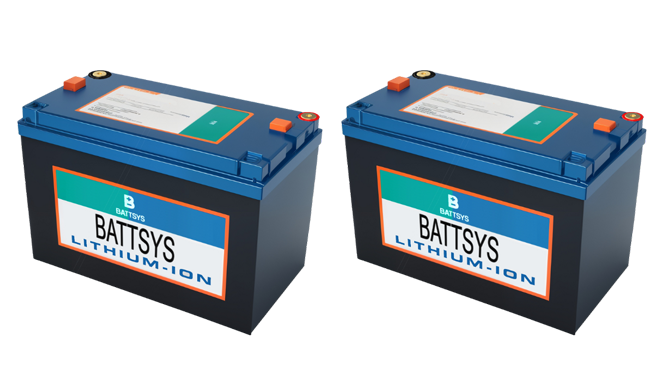Which is more suitable for electric forklift batteries, lithium batteries or lead-acid batteries?
In recent years, the world of batteries has developed to include too many very different choices. They have all achieved the same goal, but their usability, safety, reliability, efficiency, affordability, and environmental impact vary greatly - making them difficult to choose from. Fortunately, for those who rely on forklifts to run their businesses, the choice basically boils down to two types of forklift batteries: acid batteries and forklift lithium batteries. The main reason is that the potential cost savings are enormous. This is a fact that forklift lithium batteries are indeed much more expensive than lead-acid batteries, but their lifespan is 2-3 times that of lead-acid batteries, and they can also significantly save costs in other fields, ensuring a significant reduction in your total cost of ownership.
1、 Here are some of the main advantages of using lithium batteries to power electric forklifts:
Significant cost savings
● Lower total cost of ownership
● Longer lifespan
● Longer warranty period
● Safer operation
Faster and more efficient charging
No need for a battery room
● Shorter downtime
2、 What are the differences between these forklift batteries?
The important difference between these two types of batteries when powering forklifts is their ease of use. Lead acid batteries require 8 hours of charging, 8 hours of cooling, environmentally controlled storage rooms, extensive exchange operations, exposure to corrosive acids, watering maintenance, and other time intensive routine tasks. On the other hand, when the battery is low, lithium batteries only need to be plugged in for one or two hours. Fast charging of lithium batteries significantly saves costs:
Due to the much longer usage time of lithium batteries compared to traditional lead-acid batteries, cost savings are rapidly increasing and becoming significant over the longer lifespan of this game changing forklift power supply. Other factors that contribute to improving the cost-effectiveness of warehouse operations include:
Spending much less money on battery charging energy
Workers spend less time and manpower replacing lead-acid batteries
● Less time and manpower are required to maintain and water lead-acid batteries
Less energy waste (lead-acid batteries consume 45-50% of thermal energy, while lithium batteries only lose 10-15%)
3、 Charging time
Forklift new energy batteries charge faster, do not release potential harmful gases during charging, and do not require the cooling time of lead-acid batteries during charging. These are all tempting benefits. However, it now appears that lead-acid batteries are the primary energy source, even though the cost per watt hour of lithium batteries is five times that of lead-acid batteries. Before the highly respected traditional lead-acid batteries, we will have to see significant changes in forklift manufacturers.

4、 How about maintenance?
The charging program is not the maintenance required for lead-acid batteries. There are many things that need to be regularly monitored:
Balance: When the acid and moisture layers inside a lead-acid battery are present, it means that the acid is more concentrated at the bottom of the battery and it does not maintain its charge. That's why many batteries require balancing (battery balancing), which will rebalance everything - and require a charger with balancing settings (and must be done every 5-10 charging cycles).
Liquid level: Lead acid forklift batteries require the correct amount of water to operate in optimal condition. Approximately every 10 charges, it needs to be filled with liquid. For a single battery, 'watering the battery' may be a tedious and tedious task, but when dealing with large elevator groups in operation, it quickly becomes a laborious household chore.
Temperature: When lead-acid batteries are stored and used at higher temperatures, they lose their cycle and therefore have a shorter lifespan.
All these considerations mean that lead-acid forklift batteries often require preventive maintenance contracts.
At the same time, lithium batteries will automatically perform battery balancing/equalization when charged to 100. There is no liquid to handle, and the impact of ambient temperature on lithium is relatively small.
5、 How long can they last?
The service life of lead-acid batteries is generally about 1500 cycles. However, this number will be greatly affected by the use and maintenance of each battery. Improper charging, storage, or balancing of batteries can reduce the number of discharge cycles during their lifespan. Hebei forklift lithium batteries typically last nearly twice as long as lead-acid batteries: 3000 cycles.
6、 What are the security issues?
Another significant difference that companies need to consider is the safety of their employees, who must personally use these forklift batteries. After all, both types of batteries are driven by powerful chemicals.
1. Lead acid forklift batteries are made from toxic lead and sulfuric acid, and as you may already know, human ingestion of these substances is not healthy. These batteries must be watered weekly, which can lead to dangerous acid spills if not safe. They also generate a large amount of heat when charging, so they should be placed in a temperature controlled room (which is also expensive) and properly ventilated. Importantly, when they reach the top of the explosive, they may even spew out explosive gases.
2. Lithium batteries, derived from the power of intelligence, are made from a stable lithium chemical combination: lithium iron phosphate (LFP). The battery is sealed, so there is no risk of overflow. The potential risk is that the electrolyte is flammable, and a chemical component in lithium batteries can produce corrosive gases when in contact with water. However, because lithium batteries are sealed, there is usually no need to worry about corrosion, sulfation, acid overflow, or pollution - which is also beneficial for the environment.
